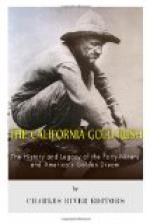Brigham could welcome graciously and leave a good impression upon important visitors. He was not a good business man, however, and almost every enterprise he directly undertook proved to be a complete or partial failure. He did the most extraordinarily stupid things, as, for instance, when he planned the so-called Cottonwood Canal, the mouth of which was ten feet higher than its source! Nevertheless he had sense to utilize the business ability of other men, and was a good accumulator of properties. His estate at his death was valued at between two and three million dollars. This was a pretty good saving for a pioneer who had come into the wilderness without a cent of his own, who had always spent lavishly, and who had supported a family of over twenty wives and fifty children—all this without a salary as an officer. Tithes were brought to him personally, and he rendered no accounting. He gave the strong men of his hierarchy power and opportunity, played them against each other to keep his own lead, and made holy any of their misdeeds which were not directed against himself.
The early months of 1846 witnessed a third Mormon exodus. Driven out of Illinois, these Latter-day Saints crossed the Mississippi in organized bands, with Council Bluffs as their first objective. Through the winter and spring some fifteen thousand Mormons with three thousand wagons found their way from camp to camp, through snow, ice, and mud, over the weary stretch of four hundred miles to the banks of the Missouri. The epic of this westward migration is almost biblical. Hardship brought out the heroic in many characters. Like true American pioneers, they adapted themselves to circumstances with fortitude and skill. Linn says: “When a halt occurred, a shoemaker might be seen looking for a stone to serve as a lap-stone in his repair work, or a gunsmith mending a rifle, or a weaver at a wheel or loom. The women learned that the jolting wagons would churn their milk, and when a halt occurred it took them but a short time to heat an oven hollowed out of the hillside, in which to bake the bread already raised.” Colonel Kane says that he saw a piece of cloth, the wool for which was sheared, dyed, spun, and woven, during the march.
After a winter of sickness and deprivation in camps along “Misery Bottom,” as they called the river flats, during which malaria carried off hundreds, Brigham Young set out with a pioneer band of a hundred and fifty to find a new Zion. Toward the end of July, this expedition by design or chance entered Salt Lake Valley. At sight of the lake glistening in the sun, “Each of us,” wrote one of the party, “without saying a word to the other, instinctively, as if by inspiration, raised our hats from our heads, and then, swinging our hats, shouted, ’Hosannah to God and the Lamb!’”




